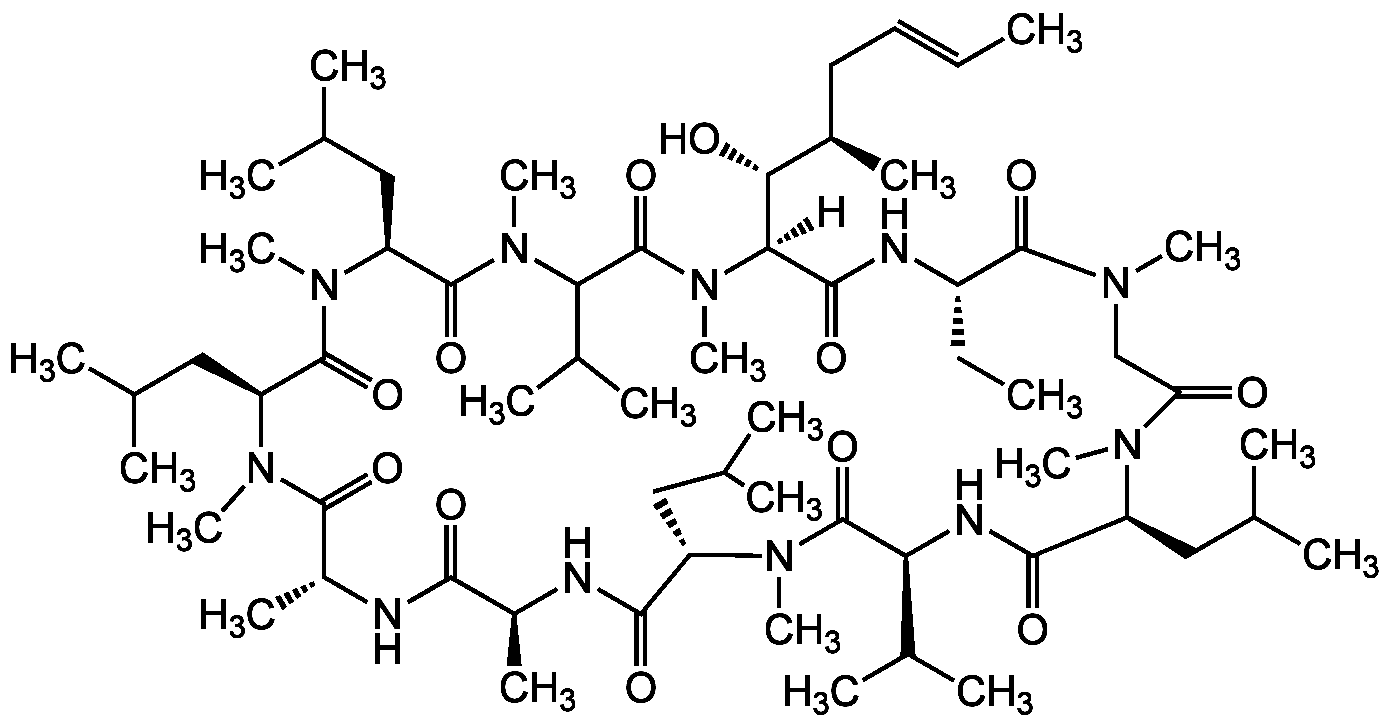
Chemical Structure
Cyclosporin A [59865-13-3] [59865-13-3]
AG-CN2-0079
CAS Number59865-13-3
Product group Chemicals
Estimated Purity>98%
Molecular Weight1202.6
Overview
- SupplierAdipoGen Life Sciences
- Product NameCyclosporin A [59865-13-3] [59865-13-3]
- Delivery Days Customer10
- CAS Number59865-13-3
- CertificationResearch Use Only
- Estimated Purity>98%
- Hazard InformationDanger
- Molecular FormulaC62H111N11O12
- Molecular Weight1202.6
- Scientific DescriptionChemical. CAS: 59865-13-3. Formula: C62H111N11O12. MW: 1202.6. Isolated from Tolypocladium inflatum. Potent immunosuppressant (same as FK-506 (Prod. No. AG-CN2-0047) and rapamycin (Prod. No. AG-CN2-0025)). Forms a complex with cyclophilin. Inhibits the activity of the calcium/calmodulin-dependent protein phosphatase 2B (PP2B; calcineurin). Prevents the dephosphorylation of nuclear factor of activated T cells (NFAT) transcription factor, leading to disruption of T cell activation. Suppresses proliferation of cytotoxic T cells and inhibits the production of T cell-derived mediators such as interleukin-2 (IL-2). Prevents rejection of transplanted organs. Anti-inflammatory compound in the treatment of several inflammatory skin diseases (e.g. atopic dermatitis) and with potential anti-rheumatic activity (rheumatoid arthritis). Antibacterial. Antifungal. Antiparasitic. Apoptosis inhibitor. Inhibits the mitochondrial permeability transition pore (MPTP) from opening, thus inhibiting cytochrome c release. NF-kappaB suppressor by induction of unfolded protein response (UPR). Anti-cancer compound. Apoptosis and autophagy inducer. Inhibits nitric oxide synthesis induced by interleukin-1alpha, lipopolysaccharides and TNF-alpha. Potently induces highly cardiogenic progenitors from embryonic stem (ES) cells. - Potent immunosuppressant (same as FK-506 (Prod. No. AG-CN2-0047) and rapamycin (Prod. No. AG-CN2-0025)). Forms a complex with cyclophilin. Inhibits the activity of the calcium/calmodulin-dependent protein phosphatase 2B (PP2B; calcineurin). Prevents the dephosphorylation of nuclear factor of activated T cells (NFAT) transcription factor, leading to disruption of T cell activation. Suppresses proliferation of cytotoxic T cells and inhibits the production of T cell-derived mediators such as interleukin-2 (IL-2). Prevents rejection of transplanted organs. Anti-inflammatory compound in the treatment of several inflammatory skin diseases (e.g. atopic dermatitis) and with potential anti-rheumatic activity (rheumatoid arthritis). Antibacterial. Antifungal. Antiparasitic. Apoptosis inhibitor. Inhibits the mitochondrial permeability transition pore (MPTP) from opening, thus inhibiting cytochrome c release. NF-kappaB suppressor by induction of unfolded protein response (UPR). Anti-cancer compound. Apoptosis and autophagy inducer. Inhibits nitric oxide synthesis induced by interleukin-1alpha, lipopolysaccharides and TNF-alpha. Potently induces highly cardiogenic progenitors from embryonic stem (ES) cells.
- SMILES[H][C@@]1([C@H](O)[C@H](C)C\C=C\C)N(C)C(=O)C(C(C)C)N(C)C(=O)[C@H](CC(C)C)N(C)C(=O)[C@H](CC(C)C)N(C)C(=O)[C@@H](C)NC(=O)[C@H](C)NC(=O)[C@H](CC(C)C)N(C)C(=O)[C@@H](NC(=O)[C@H](CC(C)C)N(C)C(=O)CN(C)C(=O)[C@H](CC)NC1=O)C(C)C
- Storage Instruction-20°C,2°C to 8°C
- UNSPSC12352200


![Cyclosporin A [59865-13-3] [59865-13-3]](https://www.targetmol.com/group3/M00/03/6D/CgoaEWY7Sz-EVPUlAAAAAErlsAE430.png)